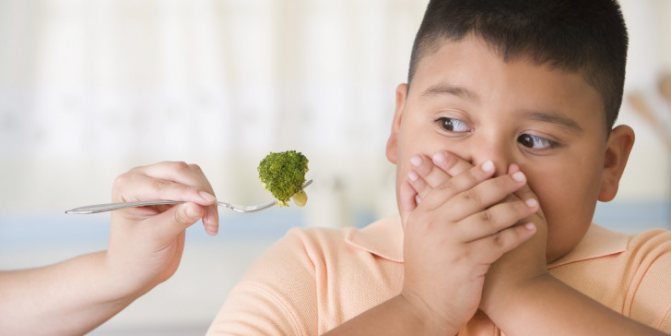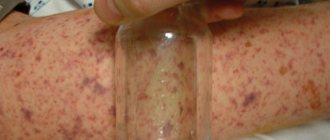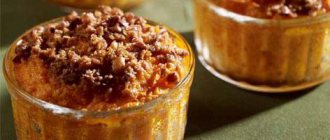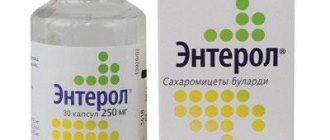A child's nutrition should be approached very responsibly. Babies react sharply to food that is offered to them for the first time. If products of dubious quality enter a child’s stomach, serious consequences for the body can occur. When a child vomits, this means that the internal defense is working: the body is trying to rid the stomach of harmful elements.
Help for a child should be comprehensive. After the vomiting reaction has been stopped, parents must decide for themselves a natural question: what to feed the child after vomiting. There was a disruption in the functioning of internal organs. In this case, it is necessary to support a weak body and restore normal digestion.
Eating while vomiting
When adults detect vomiting reactions in a child, they often note that he has diarrhea (diarrhea), which is accompanied by an increase in the baby’s body temperature.
This is a signal that the child is losing a lot of fluid. You can compensate for its deficiency by providing the patient with plenty of water. In other words, the diet for diarrhea and vomiting begins with drinking plenty of fluids.
During the first 24 hours, you need to feed your baby in alternating mode:
- herbal and black tea;
- rosehip decoction;
- mineral or lightly salted water;
- dried fruit compote.
On the second day, it is recommended to start feeding the baby if the vomiting has stopped.
It is important for parents to consider that the diet depends on the reasons for the vomiting. If there was non-compliance with the meal schedule or the child suffered some kind of stress, then after two days you can return to the child’s usual food.
In case of food poisoning or disorders of the nervous system, a more serious attitude towards nutrition is necessary. It is possible that the doctor’s advice will come in handy.
How to eat during poisoning
At such a time, any thoughts about food seem blasphemous. When the intestines are upset, it seems that there is no time to eat, but eating correctly during poisoning will help you recover much faster. At the first unpleasant symptoms, a sick adult or child should go to bed. Without unnecessary movements, it is much easier for the body to fight the infection that has appeared in it.
Important! In case of poisoning, the main task is to quickly remove harmful substances. Our bodies are trying to cope with this on their own, but let's help them by drinking plenty of fluids. In case of nausea, water helps the stomach to cleanse itself of remaining fragments of bad food.
Proper drinks for poisoning with vomiting
Drinking plenty of fluids during food poisoning is not all equally beneficial. We exclude broths, coffee, soda, and dairy products. Regular drinking water works best. Green teas and decoctions of herbs and rose hips have a healing effect; in addition, sick adults and children are prescribed the following:
For the prevention and treatment of diseases of the gastrointestinal tract, our readers recommend Monastic tea. This is a unique product that includes 9 medicinal herbs useful for digestion, which not only complement, but also enhance each other’s actions. Monastery tea will not only eliminate all symptoms of gastrointestinal and digestive diseases, but will also permanently eliminate the cause of its occurrence. Readers' opinions..."
TREAT THE CAUSE, NOT THE EFFECT!
Nutricomplex,
a product made from natural ingredients, restores proper metabolism in 1 month.
- Pay attention to the effectiveness of rice water for poisoning. It is prepared from a glass of rice and several glasses of water without any additives. The rice is strained and only the broth itself is drunk. It quickly relieves vomiting and diarrhea, cleanses the body of harmful toxins.
- If the rice decoction itself causes nausea, you can replace it with a chamomile or mint decoction.
- The most common table salt will help stop vomiting attacks. Dissolve one spoon of salt in a cup of boiled water and drink this salted water often, but in small sips.
- Sugar-free pear compote will help soothe the intestinal mucosa. Pear decoction is prepared only from dried pears or quinces and without any additives.
- If you have pomegranate in your house, know that it is a wonderful remedy for intoxication. All you need is its peel, which is infused in boiling water for 15-20 minutes and consumed as often as possible.
Nutrition after vomiting in the first days
When the vomiting has been stopped, the question arises: can the baby eat? Here experts are extremely unanimous: it is imperative to eat.
How foods affect a child's stomach
At first, the child needs a gentle diet to restore the body. A child's stomach is not ready to accept regular food right away. Parents are advised to consider preventing difficult-to-digest foods from entering the weakened digestive tract. These include:
- meat and fish dishes;
- fruit juices;
- grapes, pears, plums;
- any sweets;
- fresh baked goods and all flour products;
- raw vegetables;
- fats in the form of sunflower and butter;
- millet, barley and pearl barley;
- sausages and smoked products;
- sparkling waters.
On the first day, drinking plenty of water is a powerful weapon against illness: boil rose hips, prepare weak, slightly sweetened tea, or make a medicinal water-salt solution. This could be Glucosolan, Oralit or Regidron. For each kilogram of body weight, a child can be given no more than 170 g of solution. Portions should be 1-2 teaspoons, otherwise there is a risk of renewed vomiting.
Stomach function will improve quickly if you offer your child to eat in small portions:
- bananas;
- baked apples;
- decoction of dried fruits;
- boiled broccoli and carrots;
- yoghurts with no additives;
- kefir without oxidation.
After vomiting stops, proper nutrition is a must!
- Firstly, it is important to support a weakened child and restore strength to the body.
- Secondly, a special diet will help quickly restore the microflora of the mucous membrane of the digestive organs.
The fact is that with frequent vomiting, a disruption of the digestive system certainly occurs. Therefore, nutrition after stopping the vomiting reaction should be gentle and restorative.
What to feed a child after vomiting and diarrhea
It is important to frequently give the child water during the first 24 hours - that is, to provide the body with a sufficient amount of fluid intake. This measure will eliminate intoxication and help remove harmful substances faster. It is necessary to give:
- herbal decoctions (rose hips, linden, chamomile);
- weak black tea;
- mineral water without gas;
You should start feeding your baby only on the second day after vomiting stops. During this time, the digestive system will return to normal and begin the process of restoring its functions. Every mother should know that the menu after vomiting should be focused on the reason that caused the reaction.
For example, if vomiting was caused by stress, then you can continue the child’s usual diet without any problems. It’s another matter when vomiting and stool disorders are caused by infection or poisoning.
What's not allowed?
You definitely shouldn’t give your child foods that are difficult to digest during the first days. These include:
- fish;
- meat;
- pears, plums, grapes;
- sweets and baked goods;
- raw vegetables;
- butter;
- sunflower oil;
- sausages and smoked meats;
- barley grits;
- pearl barley;
- millet cereal;
- carbonated drinks.
All of the above products are harmful to digestive organs weakened by poisoning or infection. Such food can harm the child and aggravate the baby’s poor health.
Child's diet after vomiting
On the first day of the diet, it is important to drink plenty of fluids. You need to give rosehip decoction and weak sweetened tea. Then you should gradually begin to introduce food in small portions. The following will help restore the functioning of the digestive organs:
- baked apples;
- decoction of dried fruits;
- yogurt without any additives;
- boiled mashed carrots and broccoli;
- low-fat kefir.
What to feed a child after poisoning and vomiting on the first day?
The primary task of foods administered after vomiting is to restore the functions of the digestive system. The foods consumed by the child should be very quickly and easily digested and not irritate the gastric mucosa. Small children should be gradually introduced to mucous decoctions of rice and rolled oats.
Then, if the stomach works and there is no vomiting, they begin to give well-cooked and mashed porridge. They should be consumed only in small, frequent portions. The cereals should be boiled very well and even brought to the state of jelly. Rice or oatmeal decoction will have a beneficial effect on the health of a small child. They envelop the lining of the stomach and protect it.
Every mother should know what to feed her baby after vomiting the next day, so as not to cause any harm to the baby. Food should only be freshly prepared, boiled and warm. Any purees and porridges should not contain sugar.
Dishes must be well stewed and boiled. It is highly undesirable to give your child hot food during feeding. If your baby refuses to eat, you should never force him to eat. This means that the body has not yet fully recovered from vomiting.
On the second or third day you can introduce the following into your diet in small portions:
- vegetable puree;
- 20 g curd mass;
- low-fat soups;
- highly minced boiled meat;
- baked and steamed vegetable dishes.
This diet will help the child’s body quickly recover and return to normal after poisoning or infection. It is important to follow all recommendations of your doctor. The baby should eat tiny portions about 7 times a day - that is, every 3 hours. Every day his appetite will improve, and his digestion will return to normal. Then you can return to your usual eating habits.
A child is one year old - what to feed him after vomiting
If the baby is breastfed, then he does not need additional nutrition. If a child receives artificial milk formulas, then it is necessary to give the baby buckwheat and rice mixtures. They are well absorbed by a weakened body.
It is also useful for one-year-old children to eat well-cooked buckwheat and rice porridge. Dishes must be thoroughly wiped to a jelly state. The baby should be fed in very small portions several times a day. Then, gradually, meat soufflé, steam cutlet, and vegetable puree soup are introduced into the menu.
After vomiting, the baby should also receive boiled chicken meat, yogurt, buckwheat porridge and yogurt. You can give lean fish.
- cabbage;
- radish;
- radish;
- sauces;
- pearl barley;
- beans;
- black bread;
- any canned food;
- grape;
- beans;
- peas;
- oranges;
- beet;
- cucumbers;
- corn.
Nutrition should be gentle on the digestive organs. In the period after vomiting, it is very important to follow a proper diet and avoid taking the above foods. Vegetable or olive oil is added to dishes in minimal quantities.
2 year old child - what to feed after vomiting
After poisoning or infection, you should not give your baby hot, fatty, or cold foods. In general, the diet should be aimed at restoring the functions of the digestive tract. The first two days are a strict diet, as described above.
That is, only drink plenty of water, rice and oatmeal decoctions. On the second day, you can begin to introduce pureed bananas, yogurt without additives, and low-fat curd mass in minimal quantities. On the third day, low-fat soups, vegetable purees, well-cooked porridges from rice, rolled oats, and buckwheat are introduced. It is useful to give low-fat kefir and yogurt to drink.
If for some reason the mother doubts whether to give this or that product, then she needs to consult a specialist.
What Doctor Komarovsky says
A well-known pediatrician does not advise starting to feed a child immediately after vomiting until the child has a slight appetite. This means that the body is already ready to accept food. To begin with, water-salt solutions for drinking, as well as mint tea, are given. You can simply drop mint drops (3-5 pieces) into some water and give them to a sick child to drink.
It is also important to restore the glucose balance in the body. You can purchase a children's concentrated electrolyte preparation at the pharmacy. It is very useful for taking after poisoning and perfectly relieves intoxication of the body. Dr. Komarovsky recommends drinking 50 ml of this solution every hour. You should not drink a lot of medicine at once, so as not to provoke a new attack. You can offer your child a slightly sweetened drink made from dried fruits, or a decoction of rose hips. These drinks contain a lot of vitamins and replenish potassium deficiency in the body.
The subsequent diet is selected together with the attending physician, depending on the cause of vomiting. In case of serious gastrointestinal disease, it is necessary to very carefully introduce food into the child’s body. The diet is tailored individually depending on the diagnosis.
If vomiting was caused by poisoning, rotavirus, then you can eat foods that do not irritate the mucous membrane of the stomach and intestines. Initially, the baby is given boiled rice and oatmeal.
Homemade crackers are also useful. No oil should be added to the porridge. Dr. Komarovsky advises drinking jelly to quickly restore the gastrointestinal tract. This product has an enveloping effect and has a beneficial effect on digestion. Then puree, cottage cheese and meat are introduced into the diet.
For both adults and children, poisoning is a difficult ordeal. In the realities of modern life, there is practically no way to insure against this, but a proper diet will help to fully cleanse the body and recover faster. Today’s article contains information about what causes poisoning, instructions on what you can eat after poisoning and vomiting, and what diet will be most effective in such cases.
Poisoning with vomiting greatly weakens the body
Food poisoning always develops according to the same scenario. In the abdominal area, discomfort first occurs, developing into severe pain and cramping. All this is accompanied by nausea, dizziness, vomiting or the urge to vomit.
Important! If the usual symptoms are supplemented by a high temperature, there is no need to hope that everything will somehow work itself out. Call an ambulance immediately! There is a high risk of death with improper treatment or lack thereof, when it is not a simple mild digestive disorder, but, for example, botulism.
Causes of food poisoning
Children are much more susceptible to digestive system disorders, so it is extremely important to constantly monitor them and instill in them healthy habits. They get poisoned not only from bad food, but also from trying to put dirty fingers in their mouths. From early childhood, they should understand that they must always wash their hands thoroughly with soap - not only before eating at the table, but also on the street. In adults, the most common causes of poisoning with vomiting are the consumption of foods:
- without following processing rules;
- overdue;
- improperly stored;
- poorly washed;
- undercooked and undercooked.
Attention! Street food and fast food remain among the leading sources of poisoning. Never agree to dine in places where there is even the slightest hint of unsanitary conditions and non-compliance with technological processes for preparing food. Take care of yourself and your loved ones!
ADVICE!
Get rid of dark circles around your eyes in 2 weeks.
Features of preparing food for a child after vomiting
The main task of products that a child consumes 24–48 hours after vomiting is to be well absorbed and not to irritate the mucous membrane of the child’s stomach. For this purpose, food for the baby is crushed with a blender or using a strainer.
Cereals should be brought to a boiled state; small children can grind them into jelly. Rice and oatmeal decoctions will have a beneficial effect on the functioning of the child’s gastric tract. Mashed potatoes and all kinds of porridges should not contain sugar. The most valuable food is freshly prepared food.
All food that parents give the child to eat in the very first days after vomiting is stewed, boiled, or steamed. Hot food is extremely undesirable, however, like cold food - the delicate walls of the stomach can be injured.
And don’t forget: your child won’t want to eat right away.
First aid for poisoning
The first thing to do in case of poisoning is to provide first aid to the patient. It is important not only to cleanse the stomach and intestines, but also to bind toxins and stop their spread throughout the body. Correctly provided first aid will help quickly restore the patient’s well-being and prevent serious consequences, including the development of intestinal infection and irritable bowel syndrome. If you have vomiting and diarrhea, you should never try to stop these processes with medications, but, on the contrary, drink as much water as possible to help quickly cleanse the body. If you follow all the instructions correctly, you can not only quickly eliminate unpleasant symptoms, but also neutralize the spread of toxins throughout the body. Before giving any medications to eliminate food poisoning, you must:
- Clear your stomach.
As a rule, nausea and vomiting in case of poisoning begin immediately after the toxin enters the body, and its appearance already indicates the use of a low-quality product. Nausea may be accompanied by heartburn or vomiting, but in any case, if there is nausea, you need to immediately rinse your stomach and prevent toxins from spreading throughout the body. It is necessary to rinse the stomach after the natural urge to vomit has ceased and the bulk of the poisoned food mass has left the stomach. However, some of the toxins could remain in the stomach and continue to poison the body.
A weak solution of potassium permanganate will help cleanse the stomach in case of poisoning
It is necessary to prepare a weak solution of potassium permanganate and rinse the stomach well, or use plain water for this, but in large quantities. You need to drink a large volume of water and drink in small sips until your stomach is full. You may need to repeat the procedure several times. Once the nausea and vomiting have stopped, you should continue to drink water to replace fluid loss. An hour after vomiting, you can drink hot, strong, sweet tea to slightly soothe the stomach lining. If there is no urge to vomit, but all the symptoms of poisoning appear: chills, high fever and diarrhea, then you need to rinse with potassium permanganate and still cleanse the stomach to prevent the toxin from spreading throughout the body.
- Cleanse the intestines.
Like vomiting, diarrhea during poisoning is normal. Diarrhea indicates that some of the toxins have managed to be digested and penetrate into the intestines, where the body is trying to reject them. If you have diarrhea, you need to drink a lot of water, the more, the better. If you do not get rid of the toxin in the intestines, it will penetrate the mucous membrane and spread throughout the body. It is forbidden to take medications to stop diarrhea on the day of poisoning, but if food poisoning persists its symptoms for more than 2 days, you should immediately consult a specialist.
- Stay hungry.
The first meal after poisoning is exclusively dietary, easily digestible food. You can only drink water or tea. It is better to steam or stew food so that it does not put too much stress on the stomach. If the body is not yet ready to eat, and the feeling of hunger has not arisen, then there is no need to force yourself to eat through force. Food poisoning weakens the body, so it is not necessary to eat on the first day, but if hunger does not appear on the second day, you still need to eat some boiled rice or chicken broth to help the body recover faster.
If you rinse your stomach correctly, the symptoms of intoxication disappear after a few hours. In addition to drinking and hunger, sleep is important, so let the patient drink sweet tea and get a good night's sleep to regain strength.
Diet
After 48 hours you can enter into the children's menu:
- Curd mass, no more than 20 g.
- Vegetable puree.
- Dishes with liquid or semi-liquid consistency (low-fat soups).
- Protein-rich foods (shredded boiled meat).
- Baked or steamed dishes.
Do not force your child to eat against his will!
The child should eat at least 7 times a day every 2.5 hours. Any amount of food eaten by the baby can be regarded as the norm. Every day the child's appetite will improve.
A return to a normal diet occurs 4-5 days after the end of vomiting. A diet and a gentle eating regimen require adherence to a cycle of 2-3 weeks after illness.
Causes of vomiting
We explained why people vomit after a hangover. This is the body's protective reaction to alcohol poisoning. However, there are other reasons why the gag reflex occurs:
- If the next morning there was a single vomiting, then most likely the body is trying to cleanse itself of ethanol and its toxins. There is no need to interfere with this process. Moreover, if you feel nauseous but do not vomit, it is recommended to do gastric lavage. To do this, you need to drink a lot of water and press on the root of your tongue so that you vomit. This way you will help the body and clear the stomach of alcohol that has not had time to be absorbed into the bloodstream.
- If a person is poisoned by alcohol, vomiting occurs even after consuming a small dose of surrogate. Alcohol poisoning, which is made from methyl alcohol, is especially dangerous. This substance can cause deafness, blindness and even death.
- Vomiting after drinking alcohol may occur due to an allergic reaction or individual intolerance to ethanol. As a rule, this condition is complemented by accompanying symptoms - suffocation, cough, rashes.
- Vomiting may also occur due to disruption of the gastrointestinal tract due to exposure to ethanol. If ethyl alcohol disrupts the activity of the gallbladder, then bile will be present in the vomit. In this case, a person may feel bitterness in the mouth. Often, such vomiting may indicate incipient pancreatitis.
- Of all the types of alcoholic vomiting, the most dangerous is vomiting with blood. Such vomit will occur when the walls of the digestive tract, throat or stomach are damaged. Such vomiting needs to be treated only in a hospital setting, so it is better to refrain from taking any anti-vomiting medications until the ambulance arrives.
- If your vomit is black, this may be caused by the food you eat or may indicate hidden bleeding. Remember, no alcoholic drinks can turn the contents of the stomach black. Therefore, if you are sure that you have not eaten anything all day the day before that could affect the color of the vomit, immediately consult a doctor to find out the cause and location of hidden bleeding.
The first thing to do when vomiting after drinking alcohol is to help the body clear the stomach of alcohol and food debris. To quickly stop vomiting, you need to do gastric lavage. To treat a poisoned person, rinsing is always used. Remember, you should not combine alcohol and emetics, as the body's reaction can be unpredictable. It is better to flush the stomach mechanically. When performing this procedure, you should adhere to the following rules:
- The patient should drink at least two liters of ordinary clean water. To do this, you can take chilled boiled water or mineral water without gas. There is no need to add potassium permanganate to it, as our grandmothers did. If you want, to improve the absorption of toxic substances, you can add crushed activated carbon or other sorbent to the water.
- The poisoned person must sit or stand. As a last resort, he can be laid on his side so that the vomit does not block the airways. Then you need to press on the root of the tongue, which will induce vomiting and clear the stomach.
- After cleansing the stomach and stopping vomiting, you need to take enterosorbent. This could be the same activated carbon or another pharmaceutical drug. It will help get rid of alcohol toxins that have entered the intestines. It is worth remembering that all sorbents have one feature - after a certain period of time after adsorption, they begin to release toxins back into the intestines. To prevent this from happening, it is advisable to give an enema 2-4 hours after consuming sorbents. Thus, the sorbent and toxins will be removed naturally with feces.
- To restore fluid balance after vomiting, be sure to drink enough fluid. 3-4 liters is your norm for the day. Just don't drink in large quantities at once, as this can cause vomiting. It is better to take a sip every five minutes. Plain water, mineral water without gas, green tea, compotes, rosehip decoction, juices are suitable for drinking.
- Do not eat immediately after emptying your stomach. When you feel sick due to alcohol poisoning, it is better to eat the first meal after stopping vomiting after 4 hours. Chicken broth, boiled vegetables, and fruits are suitable as food.
It is worth knowing: if the patient has an ulcer, gastritis, hypertension, heart attack or cholelithiasis, then rinsing is strictly prohibited.
If a person vomits from a hangover and after gastric lavage, then use the following recommendations:
- You can stop vomiting with the help of a medication called Cerucal. You need to take the tablet with a minimum amount of liquid, since a large portion of water can provoke a new attack of vomiting. If it gets a little better, after a quarter of an hour you can take another tablet.
- With alcohol poisoning, an inflammatory process may begin in the intestines, which will provoke nausea and vomiting. To stop it, you can drink a decoction of chamomile, rose hips and calendula.
Nutritional features of children under one year old
Children who are breastfed with complementary foods do not need additional nutrition during vomiting. Formula-fed babies digest rice and buckwheat mixtures with milk well.
Porridge made from buckwheat and rice is good for six-month-old children. They should be boiled in water and milk in a 1:1 ratio. Complementary feeding is allowed to be included in the baby’s menu after vomiting stops: this should be done gradually. The nutrition of a child aged 7-8 months requires the presence, in addition to porridge, of meat soufflé, vegetable puree, and fluffy cream soup.
Parents would be wise to trust the child's own needs and not put pressure on him regarding the quality and quantity of food. Let the baby eat as much as he wants and whatever he wants.
Proper and healthy nutrition for a child after food poisoning
To quickly restore digestion and improve well-being, it is necessary to improve the child’s nutrition after poisoning.
In mild cases, the disease is often treated at home, so parents should take care of the correct menu and discuss the features of the daily diet with the doctor.
This will help maintain the balance of nutrients and eliminate unpleasant symptoms such as intestinal upset.
Features of the child's body
Most often, children experience food poisoning, which is divided into non-infectious and food poisoning (food poisoning). In any case, the child’s body needs a balanced diet that will not overload the digestive tract.
Weakness and fever after poisoning in a child often complicate the course of the disease. When bacteria enter the intestines, the beneficial microflora dies and cannot resist aggressive streptococci or rotaviruses. Immunity decreases, the mucous membrane of the stomach and intestines becomes inflamed. Children's appetite decreases, they refuse even their most favorite foods, lose strength, and sleep a lot.
For full development, a child’s body requires a certain amount of minerals, proteins, and vitamins. He gets them from a balanced and varied diet. If the diet for poisoning has not been selected, dysbiosis occurs in children.
For several months after intoxication, they more often suffer from acute respiratory viral infections, influenza, and other infections. Within 4-6 weeks, the child may complain of abdominal pain and have upset bowel movements. Disorders in the digestive system are often accompanied by pancreatitis, and liver function is impaired.
To reduce the risk of such complications, it is necessary to follow a special diet for food poisoning in children.
Rules for feeding a child in case of poisoning
Purpose of a strict diet:
- maintain the balance of vitamins, amino acids, water;
- strengthen defenses;
- relieve irritation of the stomach walls;
- reduce the level of toxic substances in the body;
- maintain basic blood counts at a high level.
In the first days after poisoning, it is recommended to sharply reduce the child’s diet. You can even not feed him at all, but make sure that he drinks a lot of liquid - water, fruit drinks, compotes.
Drinks should be low-sweet or completely sugar-free. If the patient asks for food, you can give him some crackers or stale white bread.
As the child's condition improves, his diet gradually expands.
The diet for poisoning in a child is based on the following rules:
- all dishes must be pureed to a liquid puree without lumps;
- For cooking, it is better to use a double boiler; bake foods without oil;
- You should not give too hot or very cold dishes, the food should be warm;
- the addition of spices and sauces is excluded.
Food is given to the baby in small portions. They are reduced to several spoons so as not to overload the inflamed lining of the stomach. The next meal is repeated after 2-3 hours.
Parents should make sure that the child does not vomit during this period.
Komarovsky and some doctors recommend not waiting for the feeling of hunger to appear: a baby at 2 years old will not yet be able to formulate a desire, so he needs to be offered food.
How to give water to a child who is vomiting
Many parents do not know what to give their child with food poisoning on the first day. It should be remembered that diarrhea provokes dehydration. With diarrhea and vomiting, not only water, but also useful substances are intensively removed, which greatly worsens the condition of the baby. For vomiting and diarrhea, you can give the patient healthy drinks:
- unsweetened fruit drinks without pulp;
- natural juices diluted with water;
- weak black or green tea;
- infusion of chamomile or rosehip;
- mineral water (the gas is pre-released).
Sometimes the baby is given compotes made from dried fruits. To prepare them, you cannot take prunes and pears, which stimulate intestinal motility. Raisins, dried apricots, and apples provide a light fixing effect. In addition, these dried fruits contain potassium, sodium and magnesium.
When a child is poisoned, food often provokes a gag reflex. Young children react painfully to its manifestation. Some get scared and flatly refuse any drink, spitting out the water. In this situation, medical assistance cannot be avoided. In the hospital, a small patient is given intravenous drips of glucose-saline solutions, which restore water and electrolyte balance.
At home, on the first day, fruit drinks and compotes can be alternated with drugs containing antiemetic and dehydrating components: Regidron, Oralit, Glucosolan. Such water-salt solutions are indispensable when refusing food; they soothe irritated stomach walls. They help normalize the production of enzymes responsible for digesting food and stimulate appetite.
What can you feed a child if he is poisoned?
In the next day after fasting, the following products are added to the menu in case of poisoning in children:
- banana pieces mashed with a fork;
- steamed pieces of broccoli;
- homemade yogurt;
- low-fat kefir.
It is better to purchase dairy products from the children's kitchen or prepare them yourself. To improve the taste, do not add sugar or fruit to them. You can use ready-made purees for complementary feeding, but only after checking the expiration date and composition. For infants, recommendations are more individual, so read about poisoning due to breastfeeding here.
When choosing what you can eat after your child vomits, you should choose light cereals. It is better to cook them in small portions from oatmeal or rice. They cover the gastric mucosa with a thin film, relieve attacks of nausea and saturate the body with minerals. Such dishes are prepared in purified water without adding oil or sugar, and pureed with a blender into a homogeneous mass.
When interest in food appears, the diet after food poisoning in children expands to several healthy dishes:
- vegetable soups;
- mashed cottage cheese;
- chicken breast pate without fat;
- puree from steamed vegetables (carrots, zucchini, potatoes).
A 4-year-old child can be offered low-fat broth cooked with the addition of vegetables. Pieces of oven-dried white bread, crackers or biscuits are offered with the broth. In combination with medications, a proper diet prevents the appearance of spasms and colic and stops intestinal upset. If it is difficult to decide what to feed your child after diarrhea, you should consult your doctor.
Menu to improve digestion
The list of foods allowed for children in case of poisoning is supplemented after a few days with light and nutritious dishes:
- baked apples;
- aromatic berry jelly;
- steam omelette;
- boiled low-fat fish;
- tender cutlets cooked in a double boiler.
For the first 5-7 days, the baby is fed fractionally, dividing the daily amount of food into 6 times. In this case, the stomach is not overloaded, digestive juice is released more abundantly. An approximate diet for a child after poisoning is very easy to prepare:
- Breakfast: unsweetened oatmeal porridge in water with 1 teaspoon of butter, 1 boiled egg, fruit broth with crackers.
- Lunch: pureed soup or broth with dried bread, baked potatoes, steamed vegetables, jelly.
- Dinner: zucchini or carrot puree, baked apple with cottage cheese, steamed fish, tea.
Small snacks in the form of compote, jelly, and a sandwich with pate will complement the menu. Between meals, the patient must be offered clean water acidified with lemon juice.
What not to give in case of poisoning
It is better to make the diet lighter in children after food poisoning. During treatment, cow's milk in any form is prohibited. It only worsens diarrhea and interferes with the restoration of microflora. It is replaced with fermented milk products, the amount of which increases as you recover.
You should not feed a child after poisoning with fatty, salty and spicy foods, therefore the following are excluded:
- chocolate and sweets;
- sausages;
- sour fruits;
- any sauces, mayonnaise;
- carbonated drinks;
- pork soups;
- mushroom dishes.
Even ordinary pasta is difficult to digest and worsens the condition of the inflamed mucous membrane of the stomach and intestines. Fried meat, sausages and ketchup are dangerous. New products should be introduced into the menu without haste 2-3 weeks after the stool is completely restored.
Diet features
In the first days, food in case of poisoning in children should be semi-liquid. All dishes are prepared without adding pepper, bay leaves, or other spices. It is necessary to achieve a neutral taste. Steamed vegetables are boiled to a soft paste and gently mashed with a few tablespoons of vegetable broth. Gradually, boiled porridge from millet and oatmeal is introduced into the diet.
If you have no appetite, it is difficult to get your baby to try food. Therefore, dietary dishes for children in case of poisoning should be served in bright plates and decorated with boiled vegetables. This will arouse your baby's interest and whet his appetite. It is recommended to put a sprig of herbs, a piece of butter, and small cubes of crackers on a plate.
How to choose the right products
To avoid the development of poisoning in a child, adults should learn to carefully choose good quality products that will benefit the whole family:
- It is better to refuse to purchase frozen semi-finished products, which rarely contain high-quality meat.
- Don't be shy about smelling chicken, meat or fish; you need to ask the seller for documents confirming their freshness.
- It is better to choose domestic fruits and vegetables that are in season and do not contain pesticides or nitrates.
- Be sure to pay attention to the expiration date of the product, the composition on the label, and the safety of the packaging.
- It is recommended to buy baby purees in glass containers and inspect the consistency and color of the product.
It is strictly not recommended to purchase meat or milk from your hands. Food poisoning often occurs after visiting cafes or eateries. Therefore, on long walks with children, you should take with you homemade crackers, biscuits or banana, and a thermos with tea or fruit juice.
Source: https://otravilsya.com/deti/pitanie-rebenka-posle-otravleniya/
Use the advice of your pediatrician to avoid poisoning:
Wash vegetables and fruits bought at the market thoroughly before eating, or even better, pour boiling water over them.
Be sure to wash your hands with soap before eating.
Brush your teeth twice a day, and rinse your mouth with water before and after meals.
It is advisable to buy products “today for today” and not leave them “stagnant” in the refrigerator.
Do not buy vegetables and fruits if you are embarrassed by spots on them or rotten areas.
Do not feed your child fish from lakes and ponds.
Do not travel with your child to the south during the hot season. For trips, it is better to choose May - the end of June or autumn, starting from the second ten days of September, when the flow of vacationers subsides.
Avoid eating frozen foods.
Be very careful with fermented milk products. Buy milk only from a milkmaid you trust.
Avoid feeding your baby canned baby food. In summer there are enough products from which you can prepare complementary foods for your baby. Even try to replace instant cereals with home-cooked ones.
Do not buy vegetables and fruits brought from afar in the summer.
If you buy ice cream for your child, it is better that it is a regular ice cream without fillers.
Unfortunately, food poisoning in young children is common. In addition to treatment, in such cases, the doctor will recommend special nutrition that will help the baby’s body replenish the loss of vital substances and recover faster from illness.
Food poisoning can be divided into two groups: poisoning itself and foodborne toxic infections.
Food poisoning is a disease that occurs after eating poisonous or toxic substances. This may include poisoning from mushrooms, poisonous berries and seeds. You can also be poisoned by chemicals: they can get into food through negligence. More often we encounter foodborne illnesses.
Foodborne illness (FTI) is an acute non-contagious disease that results from the consumption of food products containing certain types of microorganisms and their toxins. This disease occurs only in connection with eating foods heavily contaminated with toxins and/or living cells of a specific pathogen. It usually has the nature of a group disease, characterized by a short incubation period (the period of time from the moment a microbial agent enters the body until the symptoms of the disease appear) and an acute short course. Most often, the causative agent of PTI is salmonella and opportunistic flora (bacteria, fungi, viruses, protozoa, which are quite widespread in the environment and also live in the intestines of healthy people). Normally, they do not have a negative effect on a healthy body, but begin to actively multiply and harm their owner when normal conditions are violated - for example, when local immunity decreases. Their ability to cause infectious diseases of the body is facilitated by their tendency to colonize and the rapid acquisition of resistance to unfavorable factors, including antimicrobial drugs. Under the influence of various external and intra-environmental factors, opportunistic bacteria quickly change their biological properties and turn into pathogenic (capable of causing infectious diseases).
Why is continuous vomiting dangerous?
Nausea and vomiting with a hangover occur due to poisoning of the body with a toxic metabolite of ethanol - acetaldehyde. In addition, fusel oils from alcohol, acid, and sometimes methanol, which is often found in surrogate, contribute to intoxication of the body.
If vomiting after alcohol does not stop for a long time, then the danger of this situation is as follows:
- Drinking alcohol promotes frequent urination, which provokes water imbalance. Vomiting only makes dehydration worse. In addition, vomiting helps flush out useful substances and microelements from the body. As a result, a violation of the water, salt and electrolyte balance in the body occurs, which affects the functioning of all organs and can lead to dire consequences.
- If the gag reflex occurs when alcohol intoxication has not yet passed, and the person is asleep or unconscious, then there is a risk that he may choke on vomit when he is lying on his back. That is why a drunk sleeping person must be placed on his side and controlled so that he does not roll over onto his back.
- The most dangerous thing is when a hangover vomits with blood, bile or vomit that is almost black in color. This may indicate damage to the digestive tract, exacerbation of serious diseases of the gastrointestinal tract. In this case, you need to urgently call an ambulance.
Signs of poisoning
You can determine that a child has been poisoned by the following signs: the baby’s well-being worsens - he becomes weak, capricious, lethargic, complains of abdominal pain, tightens his legs; Nausea and vomiting subsequently appear. In the case of food poisoning, vomiting may be followed by a rise in temperature and diarrhea. The development of symptoms, the severity of the disease and treatment tactics completely depend on what pathogen has entered the body.
In the case of food poisoning, a child may develop a serious condition caused by dehydration - a large loss of fluid through feces and vomit. Children who, after gastric lavage, continue to have nausea, vomiting, stool disorders, or have signs of dehydration and mild or moderate intoxication, are prescribed oral rehydration (rehydration - replenishment of lost fluid) and detoxification (aimed at removing toxins from the body - for example, taking enterosorbents) therapy , which is currently recommended for use before hospitalization.
What medicines should you take if you are poisoned?
Sorbents are the main group of medications that need to be taken in case of poisoning. Sorbents or enterosorbents bind toxins, neutralize their effects and remove them from the body. You can take sorbents as soon as food poisoning begins to appear, since they quickly penetrate the intestines and absorb toxic substances like a sponge. Among all known sorbents, simple activated carbon is especially popular and should be in everyone’s first aid kit. Activated carbon can be drunk by everyone without exception.
Activated carbon is the first assistant for food poisoning
This drug is best taken in large volumes, that is, 1 tablet per 1 kg of weight, but its effectiveness is quite high, and among all drugs, activated carbon is considered one of the best to cure food poisoning. You can take activated carbon before eating exotic food or while traveling to prevent intoxication. If, after gastric lavage, nausea continues, it is necessary to allow the intestines to be cleansed with diarrhea, only then drink activated charcoal, so as not to have a strengthening effect and, conversely, not to retain toxins in the body. If nausea and vomiting are not caused by food poisoning, then you need to take other medications:
- "Entoban" or "Intetrix"
are highly effective sorbents that you need to drink when you have an intestinal infection. The drugs quickly bind and remove toxic substances and pathogenic microorganisms. The medicine eliminates toxins and restores the intestinal mucosa. - “Polysorb” or “Enterosgel”
are some of the best drugs on the domestic market that can be taken not only in case of poisoning, but also as part of complex therapy for intestinal diseases. Effective enterosorbents eliminate symptoms such as nausea, vomiting and diarrhea, normalize the condition and function of the intestines, remove toxins and improve well-being. - “Smecta”
is an excellent sorbent that helps eliminate poisoning of various etiologies, stops diarrhea and normalizes digestion. - "Linex"
is an effective drug for normalizing intestinal microflora. "Linex" is indicated for the treatment of intestinal flu and restoration of the consequences of food intoxication. - "Regidron"
is a drug that helps restore water-salt balance and electrolytes in the body. Taking the medication is indicated to prevent dehydration and normalize internal processes in the body. - “No-Shpa” or “Drotaverine”
are highly effective antispasmodics that relieve stomach pain and cramps, allowing you to normalize your well-being and eliminate discomfort.
For mild food poisoning, when there is only nausea, vomiting and diarrhea, taking sorbents is sufficient. Acute and chronic intoxication require the help of a specialist, especially in case of poisoning in children.
Promotion! For two days special price: 1 rub!
Vomiting from a hangover occurs due to intoxication of the body with ethanol and its metabolic products. Often vomits after drinking low-quality alcohol and poisoning with its surrogates. If there is vomiting, this indicates that the body itself is trying to cleanse itself of ethyl alcohol toxins, so you should not interfere with this process. Alcohol poisoning is often treated by gastric lavage and inducing vomiting. However, the opposite situation also happens when severe vomiting does not stop for a long time. This condition can be a symptom of some dangerous diseases that are exacerbated by alcoholism, and it can also cause severe dehydration. That is why you need to know how to stop vomiting after alcohol poisoning, and in what cases this can be done, and when urgent medical attention is needed.
Causes and symptoms of poisoning
You can be poisoned by either improperly prepared or spoiled foods, or those that are contaminated with pathogenic microorganisms.
Clinical manifestations of poisoning are characterized by abdominal pain, vomiting, diarrhea, weakness, high fever, and low blood pressure. However, some of the symptoms may be absent. If a person consumes harmful foods for a long time, the picture of food poisoning will resemble a chronic disease.
It is important to provide first aid as soon as possible so that the body does not begin to lose minerals and dehydration, convulsions, and loss of consciousness begin. In severe cases, it is important to go to the hospital in time.
Prevention of poisoning
There is no need to treat digestive disorders as ordinary cases of our life. No one is immune from an unpleasant accident, but frequent occurrences should make a person wonder why this happens to him.
Attention! Not only low-quality products and water are responsible for this, but also basic failure to comply with the rules of personal hygiene can lead to constant poisoning of the body with severe nausea, vomiting, diarrhea and general weakness.
Personal hygiene is an important step in the prevention of poisoning
There will be much fewer cases of food poisoning if you follow the following simple but very effective rules:
- In most cases, we wash our hands after using the toilet, but what about those situations if you had contact with an animal (even a pet)? Don't forget to clean your hands every time you want to pet your four-legged pet.
- Animals are not allowed in the kitchen while food is being prepared.
- Be sure to thoroughly wash your hands with soap before each meal.
- A housewife should have different boards for cutting meat, fish or bread products.
- After cutting up meat, it is important not only to wash your hands conscientiously, but also to thoroughly wipe and rinse all surfaces involved in preparing food.
- All fruits and vegetables are washed in running water, and if possible, doused with boiling water.
- We process potentially dangerous food much more carefully.
- If you are preparing fish, you should not allow it to be served undercooked or undercooked.
- Any type of canned food cannot be opened without washing the outside of the can with a hard sponge and some dishwashing detergent.
- Raw foods and already prepared dishes are stored according to their storage conditions and always separately.
Note! If you have rotten or partially moldy food, get rid of it without regret. They are already undergoing disease-causing processes, and even high-quality cleaning of them will not save you from possible poisoning.
Food poisoning is the body's natural reaction to a toxin. One of the most common manifestations of food poisoning is vomiting. The occurrence of vomiting and diarrhea indicates the body is being cleansed of toxin. The first symptoms of poisoning appear within a few hours and, depending on the cause of intoxication, can last up to 2 days. With vomiting and diarrhea, the body becomes dehydrated, so it is important not only to allow it to cleanse itself, but also to replenish water losses. What to do in case of poisoning depends on what is the source of intoxication. In case of food poisoning, it is necessary to do a gastric lavage, but if the cause of intoxication is poisonous mushrooms or medications, prompt hospitalization and the help of a doctor are necessary.
It is especially important to correctly eliminate the cause and symptoms of poisoning, especially when a child’s body is intoxicated. It is important to provide first aid correctly to avoid serious consequences. Treatment of food poisoning requires the use of special medications and complex treatment in order not only to remove toxic masses from the intestines, but also to neutralize their effect in the blood and stop the spread throughout the body.
So what should you eat after poisoning?
On the day of poisoning, it is better to abstain from serious food, but drink more water. Treat yourself to sweet black tea with homemade crackers. They will help you hold out until tomorrow.
Nutrition after poisoning should be gentle, since all the body’s forces go to fight pathogenic bacteria. By the evening of the first day, you can prepare low-fat chicken broth or rice porridge in water (optionally, buckwheat or semolina).
The diet should also be followed on the second day after poisoning. You can eat some steamed chicken cutlets and mashed potatoes (without milk). In these difficult times, rice water will become an indispensable dish on your table.
Food after poisoning must be properly boiled and fried. Be sure to include foods in your menu that will help improve digestion. So, in the first two weeks the body will experience a deficiency of amino acids, so diversify the diet with pea puree with canned mushrooms, seaweed, and fish. Another healthy dish is soups with cereals and borscht made from sauerkraut. But meat should be limited and, if possible, replaced with fish.
It is important not only to eat the right food, but also to do it wisely. You should not eat a couple of times a day until you are completely full. Give preference to fractional meals, in small portions 6 times a day.
Recovery diet
While the body is cleansing itself, it has no time to eat. When relief comes, it’s time to think about what is the smartest thing to eat after poisoning and vomiting. The first meals should be in small portions and between them you need to listen to yourself to understand whether everything is normal in the body. The first meal may consist of:
- a few tablespoons of chicken broth;
- liquid porridge from buckwheat or rice, which are prepared in water without any additives;
- cups of warm sweet tea with a few crackers;
- semi-liquid mashed potatoes.
Attention! In order to recover quickly from an illness, it is unacceptable to immediately put too much strain on the stomach and other internal organs. Doctors recommend large amounts of strong tea or plain water and food in a liquid or semi-liquid state.
Boiled meat can be consumed within a few days after poisoning
IMPORTANT!
How to remove bags and wrinkles around the eyes at 50 years old?
- any heavy food;
- fatty foods;
- any sweets and baked goods;
- pearl barley, barley, millet porridge;
- canned food, sausage;
- grilled meat;
- coffee, cocoa;
- hot, spicy dishes;
- eggs, legumes;
- whole milk;
- chocolate, nuts, dried fruits in dry form;
- raw fruits and vegetables.
What can a child eat after vomiting? You can give pureed food, the main thing is to give it little by little and often. Rice porridge is recommended, but not milk porridge, weak chicken broth or jelly. It is good to eat boiled chicken breasts when on a diet. It is best to steam the chicken and then thoroughly grind it in a blender.
Important! In order for the recovery process to take much less time, you must strictly follow all medical instructions. All non-prohibited foods should be consumed with caution. After recovery, it is advisable to also undergo treatment with probiotics to restore the intestinal microflora.
Prohibited products
After poisoning, you should temporarily exclude chocolate, soda, coffee, juices, jelly, canned food, fatty and spicy foods from your diet. Alcohol is not allowed. Dairy and fermented milk products are undesirable. It is better to replace raw vegetables with boiled ones.
You'll have to forget about fruit for a while. Citrus fruits can be returned to the diet first, 3-4 days after poisoning. The exception to the rule is apples, you can have them the next day, however, baked or pickled.
You can return to your normal diet when you feel that your stomach is no longer irritated.
Pharmacy medications for nausea and vomiting
If you don’t know what to do in case of alcohol poisoning at home, then vomiting can be treated with the following medications:
- As we said above, if the urge to vomit does not stop, drink Cerucal.
- As sorbents that need to be drunk after washing and stopping vomiting, we can recommend Polyphepan, Enterosgel, Polysorb, Enterodes, Smecta. These medications will help speed up the elimination of alcohol toxins from the body.
- To cope with alcohol intoxication, which is the main cause of vomiting and nausea, you can use pharmaceutical hangover medications. For example, Zorex will help speed up the elimination of alcohol toxins and neutralize the effects of alcohol breakdown products.
- Another medicine that reduces the toxic effects of ethanol and its metabolic products is Limontra. The drug contains succinic and citric acids, which stimulate physiological processes, have an antioxidant effect and increase performance.
- In addition, we can recommend Alka-Seltzer, Yantavit, Metadoxyl, Biotredin, Bison.
Remember, you should not drink an emetic while drinking alcohol to speed up the cleansing of the stomach. The thing is that it is impossible to predict the body’s reaction to a cocktail of a drug with such an effect and alcohol. Many medications are allowed to be taken only a few days after stopping drinking alcohol.
Ginger water can be used to treat nausea after alcohol poisoning. To do this, crushed ginger root is poured with boiling water and, after infusion, drunk instead of tea. Mint tea and infusion of lemon balm leaves work well against nausea. Lemon water has a pronounced antiemetic effect. To prepare it, juice from one lemon is mixed with water, bringing the volume to 0.25 liters. A teaspoon of potato juice before meals also has a similar effect.
Dish recipes
Meat soufflé
- Meat - 60 g;
- wheat bread - 5 g;
- egg -1/4 pcs.,
- butter - 1/2 teaspoon;
- broth - 1-2 tbsp. spoons.
Cut the meat, cleaned of films and tendons, into pieces and simmer in a small amount of water until half cooked. Then add wheat bread soaked in cold water, pass everything through a fine mesh meat grinder twice, add broth, egg and stir. Place this mass in a pan, greased with oil and sprinkled with breadcrumbs, and bake, covering the pan, in the oven in a water bath. Cooking time: 20-25 minutes.
Rice porridge with half and half milk
Rinse the rice, add to boiling water and cook until soft. Then rub through a sieve, add hot (but not boiling) milk, stir well. Add sugar and cook for 2-3 minutes until the porridge thickens. Remove from heat, season with butter.
Nutrition depending on the causes of vomiting
If a child starts vomiting, then the cause must first be identified. This could be overwork, initial signs of a cold, or poisoning.
If the child is overtired, he may vomit once, or in extreme cases, twice. Here it is best not to allow food intake for at least two hours. It is recommended to drink plain water, but in small quantities. Then wait a little. If the vomiting stops, then this time everything worked out, and you can feed the baby normal food.
At the initial signs of a cold, the manifestation of the gag reflex may occur over several days. In this case, you can give your child the following products:
- semolina porridge;
- soft-boiled egg;
- steamed chicken breast;
- steamed beef.
In case of poisoning, vomiting occurs quite often, with an interval of 2-3 hours. Naturally, initially you just need to contact the appropriate specialist, or even better, call an ambulance. After which you can use the following folk remedy, which helps remove the irritant from the body. This product is called fizzybrew. It is prepared like this: add two teaspoons of sugar, 1/3 teaspoon of soda to 0.5 cups of cold boiled water, mix everything. Drink this remedy at least three times a day.
In case of poisoning, which is accompanied by constant vomiting, it is necessary to exclude the following from the child’s diet:
Everything that the child will eat at this stage should be steamed. Broth is a must. Meals should be taken in very small portions at intervals of several hours. If a child vomits while eating, then you need to either refuse it for a while and give water, or wait a little longer and try to give it to eat again.
You should not feed a child if vomiting occurs at very short intervals until the condition improves.
What to do?
It all depends on the condition. This condition can last up to three days, gradually losing intensity. As a rule, the first 1.5 days are the most painful. Then the urge to vomit decreases, as does the diarrhea. By the end of the third day you feel weak, but there are no obvious signs of poisoning.
The task of the sufferer during this period is to wash the stomach. Drink as much water as possible. You can drink a weak solution of manganese. Some people drink milk, but modern doctors believe that dairy products are not helpful during acute poisoning; it is better to limit yourself to water.
Is it possible to eat bananas, apples or vegetables if poisoned? No and no. During an exacerbation, you should not eat anything. If by the end of the second day signs of relief do not appear, you should call an ambulance.
Diet after prolonged vomiting
After prolonged vomiting, it is necessary to put the child on a certain diet. You need to follow the diet for 3-4 days. Naturally, special attention should be paid to children who have begun to introduce complementary foods.
The diet after vomiting requires including in the diet:
- breast milk;
- bananas, mashed is best;
- low-calorie cottage cheese;
- boiled potatoes or carrots;
- applesauce.
It must be emphasized that any additives should be excluded. After the child’s condition returns to normal, you can gradually return to your usual diet.
For children who already eat well, the following foods can be included in this diet:
- bananas;
- boiled egg;
- milk porridges: semolina, rice, millet;
- jelly;
- boiled potatoes;
- Zucchini, peeled and steamed, work well;
- steamed pumpkin;
- boiled chicken;
- steamed fish.
It is better not to give flour products to children during this period, since the presence of various impurities and additives is very high. The latter, in turn, can again worsen the child’s condition and cause a gag reflex.
It must be emphasized that feeding a child during this period is a relatively big problem. Taste criteria change so quickly that it is very difficult to adhere to the recommended rules. However, it is necessary to feed, since the baby must still have strength to fight the disease.
What to feed a child after vomiting: 8 common causes of vomiting, recommended and prohibited foods
Vomiting syndrome is a consequence of various pathological conditions. Treatment of the underlying disease eliminates symptoms that bother the child.
Therefore, before dealing with vomiting syndrome, it is necessary to identify the original cause:
- an irritant effect on the gastric mucosa causes a protective reaction, which is aimed at expelling the pathological agent from the gastric cavity;
- Most intestinal infections are accompanied by vomiting. These include rotanoravirus infection, salmonellosis, dysentery and others. The development of rotavirus infection is more common for children, especially for those who attend kindergartens;
- food poisoning. Vomiting during food poisoning is formed by a protective mechanism;
- damage to the gastric mucosa during gastritis and peptic ulcers may be accompanied by vomiting;
- gastroesophageal reflux disease, which often occurs in children under one year of age, is characterized by the constant reflux of gastric contents into the esophagus;
- trauma, concussion, increased intracranial pressure, meningitis, encephalitis form vomiting syndrome. These diseases have a central mechanism for the occurrence of the pathological syndrome;
- migraine, sunstroke are also often accompanied by vomiting;
- surgical pathology: appendicitis, intussusception, upper intestinal obstruction. These conditions require emergency medical intervention.
Normally, crushed food from the oral cavity enters the esophagus, and then for digestion it enters the stomach and from there it passes into the intestines in portions. There are some situations in which the evacuation function changes and then food is thrown back into the esophagus and oral cavity.
This situation can occur with gastroesophageal reflux disease, spasm or stenosis of the pyloric stomach, which are often observed in newborns.
Increased secretion and acidity of gastric juice is observed in some forms of gastritis and gastric ulcer. But the direct cause of inflammation of the gastric mucosa is the bacteria Helicobacter pilori.
In cases where the child’s intestines are colonized by pathogenic microflora, which gradually replaces beneficial microorganisms, an intestinal infection develops. Most intestinal infections occur with fever, diarrhea, repeated vomiting and symptoms of intoxication.
For any illness that occurs in a child, measures should be taken. It is necessary to closely monitor his condition in the next two hours. Along with the gag reflex, diarrhea and fever may occur.
The following can trigger vomiting:
- infection;
- poisoning;
- acetonemic syndrome;
- heatstroke;
- concussion;
- diseases of the gastrointestinal tract;
- overexcitement;
- stress;
- food allergy.
It is difficult to make a diagnosis at home without medical education. Inexperienced mothers should consult a doctor immediately, especially if they are vomiting with bile.
Symptoms of infection: nausea, fever, vomiting, pale skin, stomach pain, weakness, diarrhea. The temperature may not rise. One-year-old children are more likely to suffer from this disease. They explore the world and put everything in their mouth, which easily causes infection.
Recommended meals by day
You can use the following menu to rehabilitate the child’s body.
The first day:
- Breakfast: preferably liquid semolina porridge.
- Lunch: chicken broth without meat.
- Dinner: boiled pumpkin.
- Breakfast: soft-boiled egg.
- Lunch: beef broth, preferably without pieces of meat.
- Dinner: mashed potatoes, steamed cutlet.
- Breakfast: cottage cheese with a little sugar and sour cream.
- Lunch: milk soup.
- Dinner: steamed fish, boiled carrots.
- Breakfast: milk rice porridge.
- Lunch: potato soup.
- Dinner: steamed zucchini, boiled chicken.
These days, children can be given kefir or jelly for an afternoon snack.
By following this diet, the child’s body will easily return to normal after periodic vomiting.
To summarize, it must be said that the gag reflex in children can occur from almost any food. All this depends on the individual tolerance of the body. Therefore, during this period, children should be cared for and cared for by the closest people who know their tastes.
If there was poisoning, and it was quite serious, it would be most advisable to accept the doctor’s recommendations and strictly follow his instructions.
You also need to pay attention to this point: after following a certain diet, you should not allow your child to eat everything at once - it is best to introduce food gradually.
How and when can you return your child to a normal diet after vomiting stops?
The size of portions and the frequency of eating after poisoning and the attacks of vomiting caused by it are significantly different from usual:
- On the first day, it is advisable to drink as much as possible. This is due to the fact that in case of poisoning, vomiting and diarrhea are protective mechanisms for removing harmful substances from the body. Therefore, even when the child is nauseous, give him something to drink: the attack that follows the intake of liquid, together with what he drinks, will remove some of the toxic substances from the stomach. A well-known pediatrician, Dr. Komarovsky, recommends drinking rosehip decoction, weak tea with sugar, as well as water-salt solutions, because with diarrhea and vomiting the salts necessary for life are removed from the body. Regidron, Glucosolan, Oralit are suitable for this purpose. To prevent vomiting from happening again, drink liquid in small portions. For the first 6 hours after an attack, it is enough to give a drink containing salt or glucose.
- After 6 hours you can start eating. You need to feed at least 7 times a day, but in small portions. There should be 2-2.5 hours between meals. There is no need to force it; let the baby eat as much as he wants. After 3-5 days, his normal amount of food will be restored.
- Diet restrictions should be maintained for 1 to 3 weeks after the end of the disease.

Don't force your child to eat










